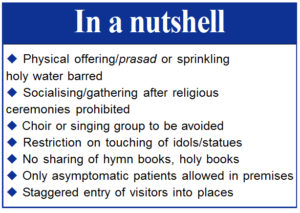By Our Reporter
SHILLONG: After a prolonged wait, the state government has finally given the green light to reopen religious places of worship in the state. However, a move as such requires a comprehensive plan as cases of COVID-19 are still on the surge in the state.
The government has, therefore, introduced a slew of guidelines or SOPs to prevent the spread of the dreaded virus in religious places of worship.
The SOPs, which were finalised in consultation with religious leaders under the banner Shillong All Faith Forum (SAFF), stated that only those places of worship, which lie outside the containment areas in the state, will be allowed to open.
The places of worship have been asked to ensure that hand hygiene (sanitiser dispenser) or hand washing and thermal screening facilities are provided at the entrance.
The organisations can place their respective requisition for thermal scanners with the District Medical and Health Officer, who will make the equipment available on payment basis, a statement issued here said.
Only asymptomatic persons will be allowed in the premises of religious worship, according to the SOP.
The authorities of religious institutes are to stagger entry of visitors as much as possible. For staggering to be effective, especially in churches, they can have multiple services on any day. The duration of the service should be restricted to the minimum but should not normally exceed one hour, the statement said. Similar steps can be used to stagger visitors’ entry into other places of religious worship.
Specific markings, with sufficient distance, to manage queues and ensure social distancing in the premises should be organised with preference to separate entry and exit points.
For churches, after completion of the services, authorities have to ensure that there is no form of socialising and meeting in groups in common areas within the premises.
The authorities are also to ensure proper crowd management in parking lots and outside the premises — duly following social distancing norms.
“Shoes/footwear can preferably be taken off inside own vehicle. If needed, they should be kept in separate slots for each individual/family by the persons themselves,” the statement said.
In churches, maximum number of persons allowed during any service should not exceed one-third of the seating capacity of the church, while one row in between two pews should be left empty. One-third of the seating capacity should also not exceed in mosques, temples, other places of worship during prayers.
In temples, gurdwaras, mosques and other religious places of worship, individuals must maintain a minimum distance of 5 feet.
Inside the place of worship, members of the same family have been advised and encouraged to sit together.
Rites of initiation, which include ceremonies of acceptance of a person into a full membership of the respective faith community like confirmations, taking of the first communion etc, are allowed at a place of worship but subject to the number of candidates, celebrants and ceremonies, to be determined by the religious authority. Communication and distribution of these elements should be done without any physical contact.
For conducting marriage ritual, the total number of persons including invitees should not exceed one-third of the seating capacity of the place of worship.
Rites of passage — deaths and burials, funerals and cremations — are permitted with limited attendees of funeral service.
However, there can be no procession to the cemetery or crematorium, and the number allowed would be regulated by the Dorbar Shnong/welfare societies and graveyard committees or management of the crematoria.
The SOPs state that touching of statues or idols, holy books etc, are not to be allowed.
As far as churches are concerned, faithful have been advised to bring their hymn books and bibles from home, and sharing is to be avoided.
In the wake of the potential threat of spreading the infection, as far as feasible, recorded devotional music/songs may be played and choir or singing groups should not be allowed.
In churches, even while singing hymns masks should be worn at all times.
Physical contact is to be avoided while greeting each other.
Common prayer mats should be avoided and devotees should bring their own prayer mat or piece of cloth, which they may take back with them.
No physical offerings like Prasad or distribution, sprinkling of holy water etc, are to be allowed inside the religious place.
During Holy Communion in churches, the one who administers the Holy Communion should wash and sanitise hands, and wear gloves if feasible, before administering the Holy Communion and further ensure that there is no physical contact with the communicants.
Offerings and collections in places of worship should be made without physical contact.
With regard to community kitchens — langars or Ann-daan etc — at religious places should follow physical distancing norms while preparing and distributing food.
As far as practicable, live streaming of services, prayers and other rituals has been highly recommended to be adopted by all religious organisations to cater to elder people, children and persons with comorbidities.
Public have also been advised to attend the place of worship which is nearest to their place of residence in order to avoid unnecessary movement.
In the event of someone being suspected of being infected from COVID-19, the authorities will have to firstly isolate the person and inform the nearest medical facility, which will then assess the condition of the individual. If the person is found COVID-19 positive, then the disinfection of the premises is to be carried by the religious authorities, according to the statement.
With regard to religious events or practices which are celebrated on a larger scale with the mass participation of crowd, the SOPs mentioned that for such occasions large congregation is still prohibited.
However, the religious organisations can approach the government for permission to hold such an event, it added.
Besides these, the public have to strictly adhere to the three fundamental health practices — wearing of masks, washing/sanitising hand periodically and maintaining social distance of up to 5 feet.




